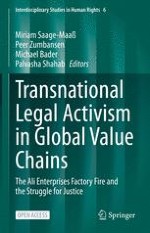This open access book documents and analyses the various interventions – legal, political, and even artistic – that followed the Ali Enterprises factory fire in Karachi, Pakistan, in 2012. It illuminates the different substantive and procedural aspects of the legal proceedings and negotiations between the various local and transnational actors implicated in the Ali Enterprises fire, as well as the legal and policy reforms sparked by the incident. This endeavour serves to embed these legal cases and reform efforts in the larger context of human and labour rights protection and global value chain governance. It also offers a concrete case study relevant for ongoing debates around the role of transnational approaches in making human rights litigation, advocacy, and law reform more effective. In this regard, the book interrogates and critically reflects on such legal campaigns and local and transnational reform work with a view to future transformative legal and social activism.
